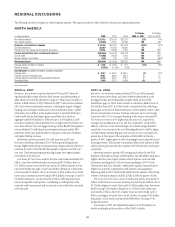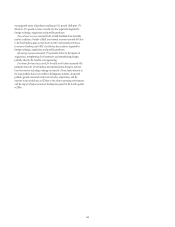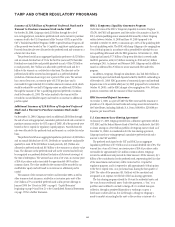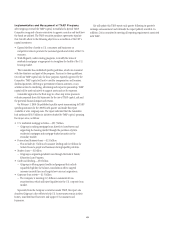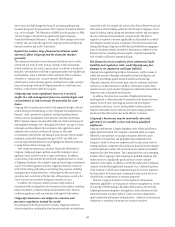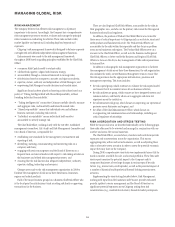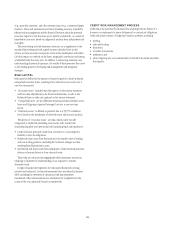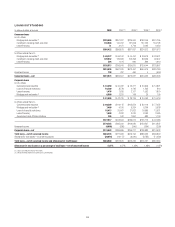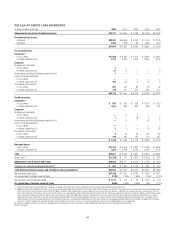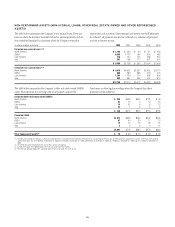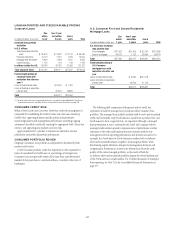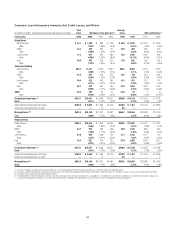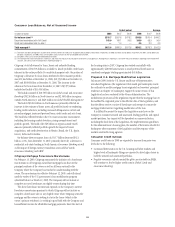Citibank 2008 Annual Report Download - page 55
Download and view the complete annual report
Please find page 55 of the 2008 Citibank annual report below. You can navigate through the pages in the report by either clicking on the pages listed below, or by using the keyword search tool below to find specific information within the annual report.time to time, the FASB changes the financial accounting and reporting
standards that govern the preparation of the Company’s financial statements
(e.g., see for example “The elimination of QSPEs from the guidance in SFAS
140 and changes in FIN 46(R) may significantly impact Citigroup’s
Consolidated Financial Statements” on page 48). These changes can be hard
to predict and can materially impact how Citigroup records and reports its
financial condition and results of operations.
Defaults by another large financial institution could
adversely affect Citigroup and the financial markets
generally.
The commercial soundness of many financial institutions may be closely
interrelated as a result of credit, trading, clearing or other relationships
between institutions. As a result, concerns about, or a default or threatened
default by, one institution could lead to significant market-wide liquidity and
credit problems, losses or defaults by other institutions. This is sometimes
referred to as “systemic risk” and may adversely affect financial
intermediaries, such as clearing agencies, clearing houses, banks, securities
firms and exchanges with which Citigroup interacts on a daily basis and,
therefore, could adversely affect the Company.
Citigroup may incur significant losses as a result of
ineffective risk management processes and strategies and
concentration of risk increases the potential for such
losses.
Citigroup seeks to monitor and control its risk exposure through a risk and
control framework encompassing a variety of separate but complementary
financial, credit, operational, compliance and legal reporting systems,
internal controls, management review processes and other mechanisms.
While Citigroup employs a broad and diversified set of risk monitoring and
risk mitigation techniques (see “Managing Global Risk” on page 51), those
techniques and the judgments that accompany their application cannot
anticipate every economic and financial outcome in all market
environments or the specifics and timing of such outcomes. Recent market
conditions, particularly during the latter part of 2007 and 2008, have
involved unprecedented dislocations and highlight the limitations inherent
in using historical data to manage risk.
These market movements can, and have, limited the effectiveness of
Citigroup’s hedging strategies and have caused the Company to incur
significant losses, and they may do so again in the future. In addition,
concentration of risk increases the potential for significant losses in certain
of Citigroup’s businesses. For example, Citigroup extends large commitments
as part of its credit origination activities. Citigroup’s inability to reduce its
credit risk by selling, syndicating or securitizing these positions, including
during periods of market dislocation, could negatively affect its results of
operations due to a decrease in the fair value of the positions, as well as the
loss of revenues associated with selling such securities or loans.
In addition, the Company routinely executes a high volume of
transactions with counterparties in the financial services industry, including
brokers and dealers, commercial banks and investment funds. This has
resulted in significant credit concentration with respect to this industry.
Citigroup’s businesses are subject to extensive and
pervasive regulation around the world.
As a participant in the financial services industry, Citigroup is subject to
extensive regulation, including fiscal and monetary policies, in jurisdictions
around the world. For example, the actions of the Federal Reserve Board and
international central banking authorities directly impact Citigroup’s cost of
funds for lending, capital raising and investment activities and may impact
the value of financial instruments the Company holds. This level of
regulation is expected to increase significantly in all jurisdictions in which
the Company conducts business in response to the current financial crisis.
Among other things, Citigroup could be fined, prohibited from engaging in
some of its business activities or subject to limitations or conditions on its
business activities, including increased capital or liquidity requirements,
each of which could lead to reputational harm.
The financial services industry faces substantial legal
liability and regulatory risks, and Citigroup may face
damage to its reputation and legal liability.
Citigroup faces significant legal risks in its businesses, and the volume of
claims and amount of damages and penalties claimed in litigation and
regulatory proceedings against financial institutions remain high.
Citigroup’s experience has been that legal claims by customers and clients
increase in a market downturn. In addition, employment-related claims
typically increase in periods when Citigroup has reduced the total number of
employees, such as during the last fiscal year.
In addition, there have been a number of highly publicized cases
involving fraud or other misconduct by employees in the financial services
industry in recent years, and Citigroup runs the risk that employee
misconduct could occur. It is not always possible to deter or prevent
employee misconduct and the extensive precautions Citigroup takes to
prevent and detect this activity may not be effective in all cases.
Citigroup’s businesses may be materially adversely
affected if it is unable to hire and retain qualified
employees.
Citigroup’s performance is largely dependent on the talents and efforts of
highly skilled individuals. The Company’s continued ability to compete
effectively in its businesses, to manage its businesses effectively and to
expand into new businesses and geographic regions depends on the
Company’s ability to attract new employees and to retain and motivate its
existing employees. Competition from within the financial services industry
and from businesses outside of the financial services industry for qualified
employees has often been intense. This is particularly the case in emerging
markets, where Citigroup is often competing for qualified employees with
entities that have a significantly greater presence or more extensive
experience in the region. In addition, in 2008 the market price of Citigroup
common stock declined significantly during the year. A substantial portion
of the Company’s annual bonus compensation paid to its senior employees
has been paid in the form of equity, meaning that such awards are not as
valuable from a compensatory or retention perspective.
Moreover, Citigroup is subject to certain significant compensation
restrictions applicable to a broad group of its senior management as a result
of its receipt of TARP funding in December 2008 as well as other recently-
adopted governmental programs and legislation. Such restrictions include
restricted executive incentives, deferral of some executive compensation,
equity awards with performance-vesting features, “clawback” provisions and
elimination or restriction of severance pay to senior executives.
49


